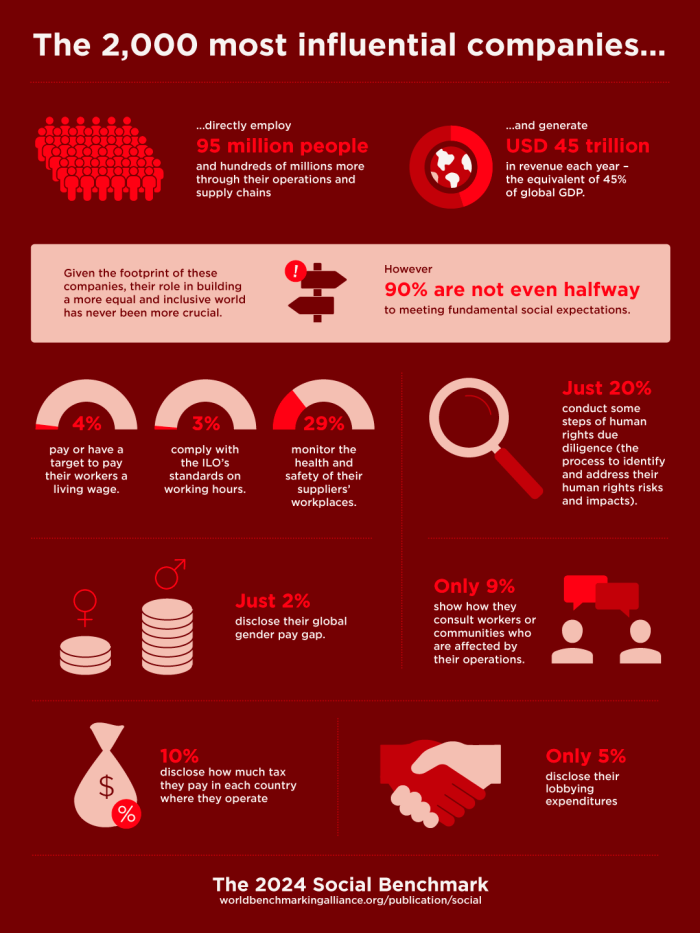See the results of the Social Benchmark
90% of world’s 2,000 most influential companies failing to ensure human rights, decent work and ethical conduct
Amsterdam, 2 July 2024 – The World Benchmarking Alliance (WBA) has today published its first Social Benchmark, assessing the world’s 2,000 most influential companies on their responsibility in meeting society’s fundamental expectations towards three measurement areas – respecting human rights, providing decent work, and acting ethically. The Benchmark reveals significant gaps and areas on which companies urgently need to make progress to ensure no one is left behind as we create an equal, inclusive, and just society.
The world’s 2,000 most influential companies – also known as the SDG2000 – include some of the largest apparel and food brands and generate revenue equivalent to 45% of global GDP. They employ 95 million people directly and hundreds of millions more indirectly through their value chains.
Alarmingly, 90% of the assessed companies are not even halfway to meeting fundamental societal expectations on human rights, decent work and ethical conduct. Over 30% of companies score only between 0 and 2 points out of 20 total possible points.

Namit Agarwal, Social Transformation Lead at the World Benchmarking Alliance, said:
The SDG2000 companies have resources and influence equivalent to some of the biggest countries, impacting more people than the populations of many nations. The fact that 90% of these companies are failing to act on fundamental social expectations shows the state of play of the private sector. Demonstrating leadership in creating an equal, inclusive, and just world could significantly aid governments in eradicating poverty, reducing inequality, and ensuring access to decent work for all. Regulation, guidance, and external pressure are necessary to steer businesses in the right direction.
WBA is calling on leaders, including policymakers and investors, to ensure companies are being held accountable for meeting fundamental societal expectations through four priority areas:
Companies should commit to paying a living wage and preventing excessive working hours
There is a mismatch between what companies disclose on decent work and society’s expectation of them: over 60% of companies have some disclosure on decent wages and over 45% have some on working hours. However, only 4% of companies commit to or are currently paying their employees a living wage, and only 3% have a working hours policy that complies with International Labour Organization standards.
Governments can help by implementing policies that ensure regular reviews and adjustments of the minimum wage to align with living costs. They can also provide support for small and medium enterprises to promote collective bargaining and implement complementary social policies to reduce the burden of living costs on low-wage workers, especially in supply chains.
Companies should be transparent in lobbying to avoid undue political influence
Only 11% of the 2,000 most influential companies have established a policy that publicly sets out its lobbying and political engagement approach. A mere 5% of companies assessed in the benchmark disclose data on their lobbying expenditures.
To maintain credibility, companies must ensure that their publicly stated social sustainability strategies are coherent with their lobbying activities behind the scenes.
Companies must engage with affected stakeholders to help improve human rights and decent work practices
Only 9% of companies communicate examples of how they engage with affected or potentially affected stakeholders, including employees, trade unions, suppliers, civil society and local communities. Companies that engage with affected stakeholders perform better on average across every indicator in the benchmark, including commitments to respect human rights and provide decent work through respecting worker health and promoting equality.
Regulation, guidance and pressure are essential for driving change
Companies headquartered in countries with human rights legislation score nearly 60% higher on human rights due diligence (HRDD) than those in countries without such regulations. Still, only 6% of companies have fully implemented them.
Two trends emerge among the 6% companies that fully meet the HRDD indicators. Firstly, they are primarily from regions with robust government guidance and regulatory frameworks on human rights, namely Europe and parts of East Asia. Secondly, they tend to operate in high-impact sectors that have been subject to greater public scrutiny and are better equipped with detailed HRDD tools and guidelines.
Governments can set minimum legal standards of behaviour expected from companies of all sizes and operating contexts on HRDD to prevent and address their human rights risks and impacts in alignment with the UN Guiding Principles on Human Rights, while investors and the civil society should continue applying collective pressure on low-scoring companies and advocating for robust due diligence processes.
Sectoral insights
While the overall average of all 2,000 companies is low (23%), some sectors on average perform relatively better, including Apparel & Footwear (33%), ICT (30%) and Retail (28%). A major commonality among these sectors is that they are all consumer-facing so the costs of failing stakeholder expectations are greater. Companies within these sectors are more prone to public scrutiny on their human rights performance particularly by consumers who would themselves be impacted by the products or services or put off by human rights abuses within the supply chain.
The Apparel & Footwear sector has the best performance overall, scoring the highest in respecting human rights and providing decent work. Meanwhile, the ICT sector performs best in acting ethically, which could be a result of the sector being subject to stringent regulations regarding data protection and privacy. The sector additionally performs best in the anti-bribery and anti-corruption indicators.
Regional insights
Companies headquartered in the Pacific, Europe and North America perform relatively better overall. Nevertheless, all regions except for Central Asia are represented in the top 10% of companies, showing that responsible social practices are possible despite regional differences. Company commitment is the determining factor.
Companies headquartered within the European Union (average total score of 34%) and the Organisation for Economic Co-operation and Development (average total score of 28%) score greater on average than the overall benchmark average (23%), whereas companies within the G20 score on average slightly less than the overall average. This signals the need for harmonisation both within and across these groups and the opportunity for global dialogue to address such gap.
The Pacific
Companies based in the Pacific score the highest overall and across all three measurement areas. The region has the greatest proportion of companies that demonstrate efforts to pay supply chain workers a living wage (11%) and disclose the amount of corporate income tax paid for each tax jurisdiction where they reside (19%). This is primarily due to Australian companies, where 19% disclose their income taxes paid compared to the benchmark average of 9% of companies.
The top-scoring companies in the region are Coles Group and Woolworths Group, both scoring 13 points out of 20 possible points.
Europe
European companies perform relatively well in all three measurement areas, second in the benchmark overall after Pacific-based companies. Europe has the greatest proportion of companies that disclose that employees are already paid a living wage or there are targets to do so (10%) and publicly expect their suppliers to comply with the ILO standard on working hours (12%). Europe also has the greatest proportion of companies (47%) that disclose a tax strategy.
The top-scoring companies in the region are EDP, Glencore, Unilever and Yara, all scoring 15.5 points out of 20 possible points.
North America
Companies based in North America perform third in the benchmark overall with an average total score of 24%, lagging behind those based in the Pacific (35%) and Europe (33%). The companies based in the United States, which equate to nearly a quarter of the benchmark’s assessed companies, have an average score that corresponds to the overall average score of 23%.
The top-scoring companies in the region are Hershey, VF Corporation, Newmont and Teck Resources, all scoring 15 points out of 20 possible points.
Asia
The benchmark breaks down Asia into four regions, with Southeast Asia scoring the highest average total score of 21%, followed by Central Asia (19%), and then East Asia (14%) and South Asia (14%).
Performance varies between and within regions. For example, if we were to remove Chinese companies from East Asia’s average, the average of the companies headquartered in the remaining economies – Japan, the Republic of Korea, Taiwan and Hong Kong – would increase from 14% to 28%. In terms of working hours, Central Asia has the greatest proportion of companies (11%) that commit to the ILO standards in their own operations, but it is Indonesian companies (Southeast Asia) that stand out with 19% of companies committing such practice, compared to 3% across all 2,000 companies.
The top-scoring company in the region is Wilmar International from Singapore, with 14.5 points out of 20 possible points.
Middle East & North Africa (MENA)
Companies based in MENA have the poorest performance in the benchmark (average total score of 11%), scoring low in all three measurement areas. Only 6% of companies in MENA commit to the ILO core labour rights in their own operations, while no companies in the region demonstrate efforts to pay supply chain workers a living wage and commitment to the ILO standards on working hours in their operations.
Despite this general trend, good practice is possible within the region. OCP from Morocco scores the highest in the benchmark overall, with 14.5 points out of 20 possible points. It is the only company based in MENA that is among the top 10% of companies in the benchmark.
ENDS
Questions? Contact our media team
